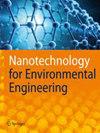Direct Z-scheme CoTiO3/g-C3N4 nanoparticles: fabrication and application as a photocatalyst for degradation of tetracycline hydrochloride assisted by peroxydisulfate or peroxymonosulfate under simulated sunlight
Q2 Environmental Science
引用次数: 1
直接z -方案CoTiO3/g-C3N4纳米颗粒:制备及在模拟阳光下过氧化二硫酸钠或过氧化一硫酸钠辅助降解盐酸四环素的光催化剂应用
本文章由计算机程序翻译,如有差异,请以英文原文为准。
求助全文
约1分钟内获得全文
求助全文
来源期刊

Nanotechnology for Environmental Engineering
Environmental Science-Environmental Engineering
CiteScore
6.50
自引率
0.00%
发文量
102
期刊介绍:
Nanotechnology for Environmental Engineering is an international peer reviewed interdisciplinary journal that focuses on publishing original research articles, critical reviews, short communications, policy papers, and mini-reviews in the following topics:
1. Application of nanotechnology for substantial benefits of environment.
2. Nano-engineering approach for improved environmental strategies for a better protection of human and environmental health.
3. Emerging strategic plans/ideas of bio-nanotechnology origin including green chemistry approach (e.g. green synthesis), molecular biology methods and chemical processes (fate determination of trace metals).
4. Biocompatibility/Cytocompatibility of nanostructured materials intended for environmental applications. Both in vitro and in vivo bioassays oriented credentials will be prioritized to scientific theoretical acceptance/validity.
5. Point of origin of environmental engineering in a mutual feedback manner to nanotechnological application for environmental problems.
6. Bio-nanotechnological elemental approach being set at transition stage (including pros and cons) with scope of environmental applications.
7. Renovated theme (engineering approach) with better skills for process engineering applications.
8. Quantitative and qualitative assessment of nanotechnological/environmental engineering methodology on practical scenario (i.e. mechanistic interpretation but not empirical evidence) basis.
9. Global phenomenon/acceptance of innovativeness of well explored ideas with a broader application in nanotechnology and environmental engineering.
10. Public Policy of environmental engineering with respect to safety and sustainability.
11. Biological/chemical/thermal conversion of agro-industrial waste into chemicals and fuels.
12. Engineering approach for biological/chemical treatment of environmental pollutant.
13. Engineering innovation in environmental monitoring of emerging contaminants.
14. Nanotechnology in pre-concentration of environmental samples.
15. Techno-economical aspects of environmental engineering and nanotechnology processes.
Continuous Article Publishing
Nanotechnology for Environmental Engineering publishes following the Continuous Article Publishing (CAP) mode. This means that each article is published online with an article citation number, shortly after receipt of authors proofs. This supports shortened publication time.
Key Information
- Nanotechnology for Environmental Engineering (NTEE) is indexed in Scopus (2020 Cite Score 4.1).
- The journal uses double-blind review.
- Papers are screening for originality and similarities before handling them by topical editors.
- The first round of peer review does not exceed 40–50 days.
- Mostly two/three or even four revisions are required before final acceptance.
- NTEE is committed to meeting and upholding standards of ethical behaviour at all stages of the publication process.
- The COPE code of conduct and Springer editorial policies are used as the basis for the NTEE publication process
Nanotechnology for Environmental Engineering (NTEE) is committed to upholding the integrity of the scientific record. As a member of the Committee on Publication Ethics (COPE) the journal will follow the COPE guidelines on how to deal with potential acts of misconduct. Authors should refrain from misrepresenting research results which could damage the trust in the journal and ultimately the entire scientific endeavor. Maintaining integrity of the research and its presentation can be achieved by following the rules of good scientific practice as detailed here:
https://www.springer.com/us/editorial-policies
 求助内容:
求助内容: 应助结果提醒方式:
应助结果提醒方式:


